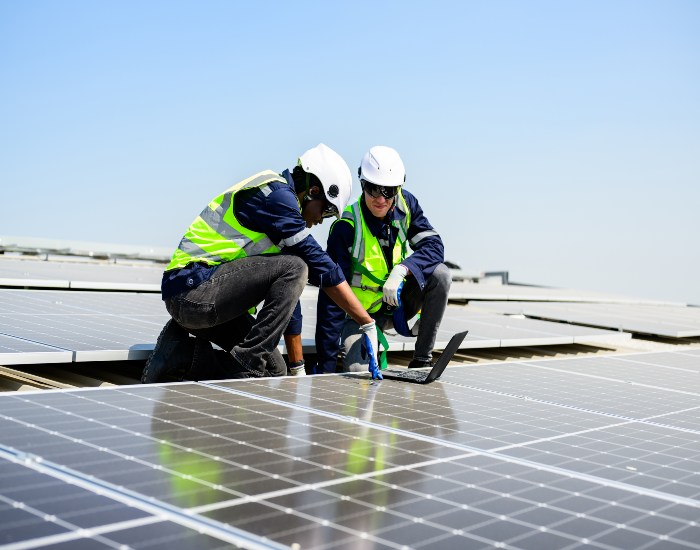Checklist for Your Solar System Installation
A Checklist for Installing a Solar System
Solar energy has emerged as one of the most sustainable and cost-effective energy solutions for homes and businesses. Whether you’re considering a home solar system or a commercial solar system installation, taking the time to plan thoroughly is crucial for success. Solar panel system installation can be a seamless and rewarding process when approached with a comprehensive checklist.

Factors for Solar System Installation Checklist
1. Assess Your Energy Needs
Understanding your home or business energy requirements is the first step toward a successful solar panel system installation. Begin by assessing your household or business energy use through utility bills or professional energy audits. These tools help identify how much electricity you use on average and during peak times.
Tailoring the size of your solar system to meet your specific energy needs ensures maximum efficiency and cost-effectiveness. Whether you are planning a home solar system for residential use or a larger-scale commercial solar system installation, an accurate energy assessment will provide a solid foundation for your project.
2. Inspect Your Property
Your property’s readiness for solar installation depends on several factors, including the condition of its roof, its orientation, and the amount of shade in the area. A sturdy roof with adequate space that faces the direction that receives the most sun throughout the day offers optimal sunlight exposure.
If your roof isn’t suitable, alternatives such as ground-mounted systems can be explored. Home solar system installers can perform a detailed site evaluation to recommend the best options for your property. Proper inspection at this stage prevents future challenges during the installation process.
3. Research Local Regulations and Permits
Solar installations must comply with local laws and regulations. Familiarize yourself with zoning laws, building codes, and utility interconnection agreements in your area. Acquiring the necessary permits is a vital step before the installation of a solar system begins.
Researching incentives like tax credits, rebates, and net metering programs can significantly reduce your overall installation costs. Your home solar system installers can often walk you through the permitting process, making sure you comply with local regulations and maximize available benefits.
4. Choose the Right Solar Installer
Selecting reliable and experienced home solar system installers is critical to the success of your project. Look for certifications such as NABCEP, which indicate professional expertise. Reading customer reviews and evaluating quotes can help you identify trustworthy contractors.
In addition, inquire about warranties for both labor and equipment. The right installer will not only ensure a high-quality installation but also provide ongoing support for maintenance and repairs.
5. Select the Right Equipment
Solar panels, inverters, solar batteries, and mounting systems are the primary components of any solar installation. Choose equipment that aligns with your energy needs, climate, and budget.
Compare the efficiency ratings, durability, and warranties of various brands and models. Selecting high-quality components will enhance the overall performance and lifespan of your solar system. Discussing these options with your solar installer can help you make informed decisions.
6. The Durability of the Solar Systems
Investing in durable solar systems ensures long-term performance and reliability. High-quality solar panels typically have lifespans exceeding 25 years, while solar inverters and batteries may require replacement sooner.
Evaluate factors like weather resistance and build quality when selecting equipment. Ensure warranties cover defects and performance guarantees, providing peace of mind for your investment.
7. The Expected Length of the Project
Understanding the timeline for your solar panel system installation helps manage expectations and reduces stress. The process generally includes initial assessments, permitting, equipment procurement, installation, and system activation.
Stay in communication with your installer to address potential delays and make sure the project stays on track. Clear timelines allow you to plan accordingly and avoid unnecessary disruptions.
8. The Cost of Installation
Solar installation costs include equipment, labor, and permitting fees. Consider financing options like solar loans, leasing agreements, or power purchase agreements to make your investment more affordable and accessible. Take advantage of incentives like tax credits, state rebates, and local utility programs to offset costs. Discuss these opportunities with your installer to ensure you maximize savings.
9. Prepare for Installation Day
Preparing your property for installation is a straightforward but important step. Clear the installation site and ensure access for technicians. Review the installation plan with your contractor and address any final concerns.
On installation day, technicians will mount panels, connect inverters, and establish wiring. Stay involved to monitor progress and ask questions as needed.
10. Post-Installation Checklist
After installation, verify that the system is functioning as intended. Review warranties and schedule routine inspections to ensure longevity. Familiarize yourself with monitoring tools to track energy production and performance.
Monitor and Maintain Your Solar System
Regular monitoring and maintenance are vital to keeping your solar system in optimal condition. Clean panels periodically to remove debris and ensure maximum sunlight absorption. Check for signs of wear, such as loose wiring or damaged components, and address issues promptly. Maintaining an ongoing relationship with your home solar system installers can simplify repairs and upgrades when needed.
Maintain Peace of Mind With Our Solar Panel Installation Checklist
A well-planned solar system installation delivers significant long-term benefits, from reduced energy bills to environmental sustainability. By following this comprehensive checklist, you can navigate the process confidently and enjoy the advantages of renewable energy for years to come.
Let Kapital Electric, Inc. Install Your Solar Panels
Ready to harness the power of renewable energy for your home or business? Kapital Electric, Inc., a trusted leader in solar solutions throughout Chicago and suburban Illinois, is here to guide you through every step of your solar system installation. From expert design to seamless implementation, we deliver customized solar solutions tailored to your needs. Contact us today for a free onsite evaluation and take the first step toward reducing energy costs, increasing sustainability, and achieving energy independence with a solar panel system that works for you. Let’s build a cleaner, brighter future together!
